- Home
- Peter Rimmer
Just the Memory of Love
Just the Memory of Love Read online
Just the Memory of Love
Peter Rimmer
Contents
Prologue
Zambia 1994
Part 1
Chapter 1
Chapter 2
Chapter 3
Part 2
Chapter 1
Chapter 2
Chapter 3
Chapter 4
Part 3
Chapter 1
Chapter 2
Chapter 3
Chapter 4
Part 4
Chapter 1
Chapter 2
Chapter 3
Part 5
Chapter 1
Chapter 2
Chapter 3
Part 6
Chapter 1
Chapter 2
Chapter 3
Part 7
Chapter 1
Chapter 2
Chapter 3
Epilogue
Dear Reader
Glossary
Principal Characters
Place Names
Join Peter’s Band of Readers
About Peter Rimmer
Also by Peter Rimmer
Acknowledgments
Prologue
Zambia 1994
* * *
The Reverend Hilary Bains, male Caucasian, sometime missionary, watched the orb of the sun sink into the upper reaches of the Zambezi River, silhouetting the Phoenix palms and the big acacia trees clutching the banks above the flowing water. The clouds in the heavens were aflame and painted the oily flotsam and the flat surface of the moving river, a blood red. The reverend wore long trousers and well-laced garters around his ankles to keep out the mosquitoes. It was October, hot, and the yesterday-boiled weir water in his whisky made the drink insipid. The insects screeched from the surrounding bush and on the other side, opposite where he sat on his rickety veranda, an old elephant drank the rushing waters which glowed red from the last rays of the dying sun. It was the missionary’s sixtieth birthday and the celebration of his forty years in Africa. He was alone in body and spirit, more lonely for the lost, useless years than for any wife or children. Africa. Everything had changed and everything stayed the same. The brave words of freedom, the effort of missionaries, had been defeated by Africa. When the rains fell the people ate. When the rains stayed away they starved. The few elite enjoyed the fruits of freedom and the people lived in the same daily, miserable, hungry, diseased, mind-destroying poverty. Hilary Bains was quite sure he had wasted his life.
By the time he had finished his whisky the light had gone, night coming to Africa like a cloth placed over a cage. To light the oil lamp would bring the bugs. He tipped the bottle into his glass from habit, adding the thick river water, and drank a drink to the long years of his life. He could not remember whether he had eaten that day, but it did not matter. The old wicker chair had moulded to his body over the years and he was comfortable. A comfortable man with a case and a half of whisky. A hippo grunted forty metres down in front of his veranda, in the still pool away from the tug of moving liquid, oozing its way to the big drop of the Victoria Falls one hundred and eighty kilometres downriver… He had done it in a flat-bottomed boat, through all the rapids, but many years ago. That was when the white man dreamed of a Federation of Central Africa to rival the economy of Canada. And then came Harold Macmillan and the winds of change blew it all away and the kwacha, the currency of Zambia, formerly Northern Rhodesia, dropped over the heady years of independence, from two to the pound sterling to one thousand and thirty. A brave wind it was, the cold brave wind of poverty, nations born to be beggars for the rest of their natural lives. Everything had changed and everything had stayed the same. Hilary shivered in the heat.
Two hours passed. The old Labrador that slept at his feet pulled up its scarred head and cocked an ear, the new moon washing their corner of the front veranda. The screeching cicadas, along with the cacophony of a thousand river frogs, drowned the night in noise but Hilary knew there was something else. They were both going a little deaf but the dog could always hear better than his master. Tensely they waited. Something big splashed in the river upstream and still the dog’s head was up, ears cocked. Then he got up and turned to face downriver. Hilary stood up with difficulty. A long searchlight was playing over the river, cutting the north bank, and then he too heard the engine noise of the riverboat and the thought of people passing so close and yet so far made the loneliness sink him back into his chair and with morbid interest he watched the powerful light probe the darkness of the riverbank, flicking enquiringly between the gaps in the tall trees. And then, suddenly, harshly, like a World War Two bomber pilot caught by the searchlights, it found him in his chair and stayed, holding him like a big, old and worthless moth in the light. And then he heard the riverboat’s hooter beep a friendly tune and the craft, a two-decker raft of a boat, headed for the calm waters of the hippo pool where a small, pathetic jetty was the reverend’s only contact with the outside world. His spirits lifted and he stood up to wave. The old dog gave a friendly bark, and the light moved down to search out the rickety jetty and the thatch-roofed house was back in its all-embracing darkness. The engine of the riverboat cut.
“Hilary Bains?” a voice shouted. An English voice.
“Who wants him?”
“Happy birthday… Will Langton… How are you, you old bugger?”
“What on earth are you doing here?”
“I’ve come to take you home. You want to give a young man a whisky?”
The young man was an old joke as Will Langton was only three years younger than the man his parents had adopted during the war, the refugee who had come down to Dorset to be away from the German bombs and stayed.
Hilary went into his lounge and lit the paraffin lamps around the walls and over the stone fireplace. They all smoked a black plume that rose up to the open ceiling and the neat underside of the thatch. He looked for a clean glass, found a dirty one and washed it under the tap, a luxury created by his windmills. When Will Langton, youngest of the pre-war generation of Langtons of Langton Manor in the county of Dorset, climbed up to the house with a cool bag full of ice, he was ready for a guest, the first in five months when last the supply boat came up from Kasungula. They had not seen each other for more than ten years and as they shook hands, smiling into each other’s eyes, each was appraising the other, shocked at the ravages of age. Hilary’s hair was white and long, down on his shoulders for lack of a barber; his sunken eyes, dark brown and brooding above the sharp nose, had deep crow’s feet etched into their corners from decades of being held half closed against the African sun, while deep lines cut down from nose to jaw. He was thin, overly thin, the result of too many years of toil and malaria. Hilary Bains was now an old man and he read the message in the violet eyes of his childhood friend.
“Hell, you look good,” said Will and meant it for the being of the man. “Here, have some ice. The captain said you don’t have ice and he’s not coming up as he doesn’t like the climb. Seventy-four steps. Only man they said who’d bring a boat this far and you can’t live here alone, Hilary. Come back to England. You’re retired now.”
“Thrown out. They want black priests, Will.” Then he laughed with a touch of apprehension. “You said you’d come and dig me out but I never believed you would. Now, sit down in that armchair and I’ll bring in the one from the veranda… You’ll stay a day or two. You’re busy I’m sure. But a day or two. We have our compensations… That old leg still give you trouble? Remember the day you tore the cartilage?… Hope you had supper? Not much of a cook. I think I had breakfast. You’ll forgive me gabbling, old boy, but when you don’t talk for months you gabble a lot when you find the chance. England’s all right but I d
on’t have the money. London Missionary Society like to give things away to the deserving and they don’t think old white priests deserve very much. Here’s all right. Student of mine from the sixties owns three thousand acres on both sides of the river. Sort of compensation for his part in the struggle. No one lives on the farm anymore, except me who could mend a tractor if it broke down out here. This place was a tobacco farm when I first visited. Now it has gone back to the bush. Sit down. Sit down and tell me everything. You can’t say in a letter what you can say to a man’s face. Now, how’s your mother? Our mother as she wanted me to say, but I was never a Langton, you see. Never a Langton. No, never that. You can’t be what you’re not. Now sit down, Will, and I’ll mix you a drink. Didn’t by any chance bring any water? Roof water dried up in the tanks two months ago and it won’t rain again till November if it rains at all. Terrible rains and all the people gone to Lusaka and nobody plants. Please, sit down. Prefer squatting in squalor outside the cities. The blacks, I mean.”
“Let the ice melt.” Will was smiling, a hundred memories turning in his mind.
“Right-oh, old boy. Doesn’t take long in this temperature. Suicide month, October, before the rains break. Always called it suicide month. But you know that. You did have suicide month in Mongu?”
“It was very hot but I don’t remember anyone killing themselves.”
“And Randolph, how’s big brother Randolph? And Jo, still as fiery as ever? She would have invented the Labour Party if it wasn’t around. What do they call them now? Politically correct, that’s it. Good old Jo, always politically correct and no damn good to anyone. Priests shouldn’t swear but I’m not sure whether I am a priest anymore. You know the most terrible thing, William? I’m not sure anymore if there really is a God.” They both thought about that in silence. “And Byron’s still making money. That will never change. I could never make up my mind whether Jo’s politics were more twisted to suit her cause of the moment or Byron’s business antics to suit his pocket. What an unlikely set of twins… I was very sorry to hear about the group captain. Now there was a good man.”
Will sat down with his drink and raised it to his old friend now perched in a faded green wicker chair with an uncertain front right leg. The dog was next to him, the oldest black Labrador that Will had ever seen, the liquid and slightly rheumy black eyes watching him intently for any mistakes. A small bat crawled out from behind a picture frame, the one holding a very amateur painting of the Victoria Falls, probably the work of Hilary, and flew round the room at considerable speed looking for insects with its radar, Hilary and the dog taking no notice. Twice Will ducked and once slopped his drink, changing hands and sucking the whisky off the back of his hand. He made up his mind to sleep on board in his cabin. He had been out of Africa too long to bed down with a colony of bats. By the time he had sipped half his drink three more bats had joined the food run. He would talk about the family in the light of day and for the moment enjoy his whisky in the last outlandish outpost that still housed an Englishman, washed up and left behind by an empire whose flag had flown over one-fifth of the world’s surface when the man in front of him had been born in 1934.
It had been a long journey from London. Flight to Johannesburg, because Air Zimbabwe were having a ground crew strike, then South African Airways to Bulawayo and the overnight train to the Victoria Falls. Then the trip upriver, the river high and flooding from early rains in Angola, the old riverboat captain, the only man with the skill to navigate the endless rapids, keeping the screws of the big diesel motor off the rocks and in the water, the steel tubes that made up the floats grinding the rocks, searching for deeper water, the double-decker canting. He had said he was coming, so he came and ignored the images of crocodile and hippo. They did white-water rafting for fun downriver from the Falls and with many a spill, no one had been taken by a crocodile… They had seen nothing on the river and little of human habitation on the banks. One village the captain said had been killed by AIDS. Empty. Not even a long-legged chicken. Most of the hut roofs had fallen in. Hilary was still talking, not seeming to expect answers. Will listened, equally conscious of the night sounds of Africa outside. Maybe Hilary talked to himself alone at night… Will got up from his dilapidated armchair and poured them both another drink. Africa and booze went together… Old animal skins from the original white owner still graced the stone floor and from one window hung the tattered remnant of a curtain, that once upon a long time ago had boasted yellow flowers. Rats had eaten most of the curtaining. The fly screen for the door and the open windows were flyblown but of a newer vintage. It was obvious the reverend could not afford servants. Will looked back at his friend and tuned back in to the conversation.
“It’s not as bad as it looks,” Hilary was saying. “I grow vegetables and catch fish in the river. Tomorrow I will show you my windmills and my bathroom and you won’t believe such luxury in the middle of the bush. I have some fowls, a constant battle with the genets. Nasty little creatures. Just eat the heads off and leave the rest. Oh, don’t look at me like that, Will. I’m all right. Sort of the last remnant of the British Empire. Left behind but not quite forgotten… What would I do in England? I’m quite happy. I have found that I enjoy my own company. Live in the past. Enjoy the small triumphs and ignore the faux pas. I keep myself busy keeping myself and this old dog alive. There’s a bucket outside with a hosepipe connected to the middle of its bottom with the long end of the hosepipe in my shower room with a tap and nozzle. I fill up the bucket at ground level and hoist the bucket and length of hosepipe to the top of a tree with a rope pulley; cold water in the summer and hot on a winter’s morning. Then turn on the tap. First time it worked I ran around the house with nothing on, I was so excited.”
“Don’t you get lonely?”
“Yes, of course. Sometimes. But you can be lonely surrounded by people… Those bats won’t get in your hair. Old wives’ tale… You’ll have to sleep on board, old boy. This is a one-bed family. Do you think they ever thought the empire in Barotseland would come to this? We must’ve poured millions down the drain in this part of the world, but you’ll remember. Not to say the lives.”
“You think they would have been better off without us?”
“Of course. Nature would have kept its balance, it was fools like me who rushed in with our one and only God and upset the balance of nature.”
“Would you do it all over again?”
“If I was young, brainwashed and pumped up for man’s salvation. If you ask me if my life was worth it I would say no. Do-gooders should mind their own business. It’s something we westerners don’t do too well, minding our own business.”
“Can you leave Africa to its own devices?”
“Well, you either do that or run it properly. You can’t feed nations that can’t feed themselves because their lifestyle has been shattered by overpopulation. No, you either come back in and run the place or get out and let disease re-establish the balance of nature. Africa is overgrazed and you can’t keep sending in fodder from the other side of the world. I told that to my black bishop, but he’s one of the new elite who live very well thank you on foreign aid. Never tell a bishop the truth, Will. Probably best thing is never tell anyone the truth. And if you and I don’t find our respective beds, we will fall asleep in these chairs and both of them are too uncomfortable for that. We will never solve the world’s problems so what is the use of trying?… You want to tell me all about the family? Tomorrow. I can wait. I do a lot of waiting these days.”
Waiting to die, he thought, but didn’t wish to sour the evening. William could do all the talking in the morning. He was tired and a little drunk.
Will Langton found it difficult to sleep when he found his bed on the lower deck of the riverboat. The decrepit old man in the neglected house on the African river, the friend of his childhood, had once been going to make a difference. Will could see it all in his mind’s eye. All the education and study, working to the limit of a schoolboy’s ability. Struggl
ing at every stage to succeed, to be better. Growing up and being one of the winners and it had all come to this! The windows in the cabin were open and screened against mosquitoes. A slight breeze wafted damp air across his naked body. The pillow was wet from his own sweat. He was probably trying to sleep six feet above a family of hippopotami. Once he heard a leopard cough and then he was asleep, never remembering the moment.
Birdsong, glorious, rejuvenating birdsong woke him to the dawn, and he pulled the sheet up and over his nakedness. The big cabin windows showed him the rising sun and when he leant up on his elbows, he could see the wide expanse of river, oily, impenetrable to the human eye, flowing endlessly on to the distant sea using its millions of years of experience to know where to go. A black man was fishing from a dugout canoe, a floating, hollowed-out log, crude and dating back into the ancient past. The man looked content catching nothing and Will wondered where he came from and what he thought, if he thought at all. What a blessing not to have to think. Through the opposite window, the low thatched bungalow looked cared for from a distance, huddled between the tall acacia trees – fever trees they had called them once, before man knew malaria came from the water that nourished the mosquitoes. His Africa was a long time ago and he remembered the excitement. Everything seemed better. The question he asked himself in the first light of dawn was simple and complicated. If he left Hilary in his tumbledown house on the river, how would he survive? And then again, how would he survive at Langton Manor, cold and damp and nothing much more there for Hilary to do with the rest of his life? The Church of England was contracting, down to two million churchgoers from a time when every Englishman went to church, his religion a deep part of his life. No one was looking for a worked-out missionary in Langton Matravers any more than they were anywhere else in Europe. It was the new age of television evangelism, a euphemism for ripping off the public in the name of God… Will smiled. Maybe that long white hair could raise a fortune, the sunken eyes still burning from the African toil…

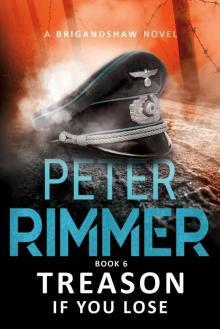 Treason if You Lose
Treason if You Lose Just the Memory of Love
Just the Memory of Love On the Brink of Tears
On the Brink of Tears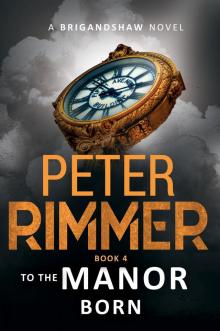 To the Manor Born
To the Manor Born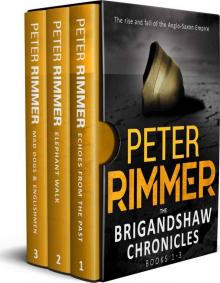 The Brigandshaw Chronicles Box Set
The Brigandshaw Chronicles Box Set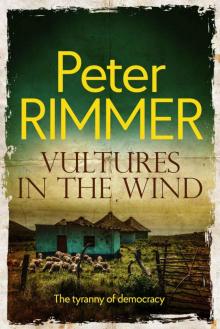 Vultures in the Wind
Vultures in the Wind Mad Dogs and Englishmen (The Brigandshaw Chronicles Book 3)
Mad Dogs and Englishmen (The Brigandshaw Chronicles Book 3)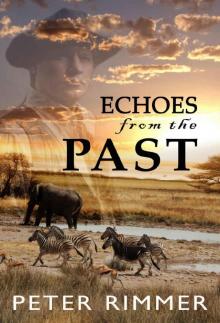 Echoes from the Past (The Brigandshaw Chronicles Book 1)
Echoes from the Past (The Brigandshaw Chronicles Book 1) Elephant Walk (The Brigandshaw Chronicles Book 2)
Elephant Walk (The Brigandshaw Chronicles Book 2)